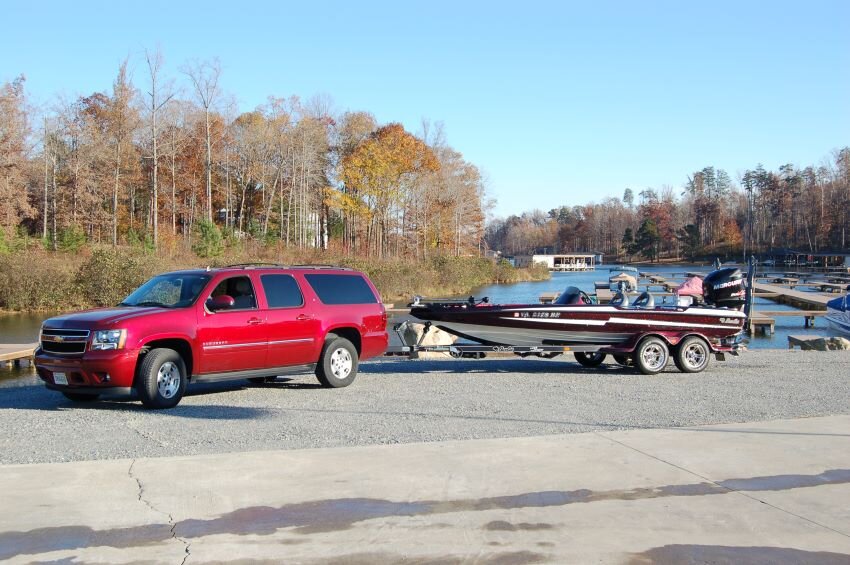Slow Down to Preserve Your Bass Boat
Despite the fact that avid anglers are willing to pay increasingly large sums of money to own top of the line bass boats, many of us tend to treat them like crap: We fly through big, fiberglass-cracking waves; we navigate through log jams to get to out of the way spots; and we fail to do routine maintenance that will save us future headaches. If you have a bass boat along with a warranty, an insurance policy and a wallet there’s a pretty good chance you will use the latter three at some point during your ownership tenure.
Mistakes I’ve Seen
Of course, not all bass boat breakdowns and snafus are due to aggressive driving. Some are pure and clean operator error that could have been easily avoided. During my 25 years of boat ownership and tournament angling I’ve been guilty of a few. I’ve tried to launch the boat with the rear tie-downs still attached. I’ve also made it five miles up the road from the house before a passing driver helped me understand that I’d been trailing 50 feet of orange extension cord the whole way.
I’ve seen others who did similar dumbass stuff. Years ago a friend had a consistent bout of motor troubles, and when he got his boat back from the mechanic he headed straight to his next tournament to try to regain some points and some pride. He dropped the boat in the water, tried to idle to his next spot and things just got worse. It wouldn’t steer or trim down. He ended up fishing near the ramp for most of the morning, intermittently starting up the motor to see if he could figure things out. Eventually, he did. In his haste to compete, he’d forgotten to take off the motor toter.
At that same tournament location, another friend had an issue with the electric trolling motor on the front of the boat. Nothing mechanical—it worked well all day. As he waited for his partner to back the trailer down the ramp to load up, a fast-approaching thunderstorm hit the area, complete with nasty lightning. He got the boat on the trailer, leaned over to hook up the winch strap, and as he did so kneeled on the trolling motor pedal. The propeller started to spin and cut the hell out of his hand. He ended up going to the emergency room but it could have been worse—it could have been his face instead of his knee and he could have had a metal prop instead of the standard plastic one.
None of these situations proved to be catastrophic, but comparable omissions or failures can leave you with your boat in a ditch, your motor totaled, or someone severely injured.
Not all accidents are avoidable, but what I’ve found is that by slowing down we tend to minimize those that are. In each of the examples above, the person was in a hurry, for varying reasons. A few extra seconds of care could have eliminated a trip to the ER, a destroyed motor toter, or an extension cord rubbed down to the wiring. Whether you’re headed to the boat ramp down the street, home after a hard day of fishing, or on a thousand-mile trek to the hottest lake in the country, by taking a few extra minutes along the way you can reduce the number of problems you encounter.
Don’t Be in Such a Hurry
Yes, whether we admit it or not, speed is one of the things that we like about our boats. Heading down the lake at 60 miles per hour is exhilarating, but passing someone at 70 miles per hour is near-orgasmic. Safe on-the-water boat operation is a subject for another day, However, before hitting the water, or once you’re off the water, you’ll benefit from slowing down and controlling the variables that are most controllable. It may save your bacon in the long run, or at least a lot of aggravation.
Short Term Things You Can Do to Protect Your Bass Boat
Visually inspect – Regardless of how long you’ve been boating, the best tools to understand whether something has gone wrong—or is about to go wrong—are your eyes. Take a quick visual inspection of everything before you get on the highway and you’ll be surprised at how often you see a potential problem and stop it before it occurs.
Clear the deck – Before you get on the road, make sure that there’s nothing on the deck of your boat that could easily fly out. This includes your $15 Jack Hammer and your $22 Megabass Vision 110. It also includes items like stray tungsten weights, which if launched properly could go through the windshield of the vehicle behind you. Keep your rods in the rod locker until you get to the water, or put them back in for the ride home. The water, grit and road debris is terrible for them.
Check trailer connections – After hearing stories years ago about vandals who pulled the pins on trailers sitting at a boat ramp, I’ve always been leery of the possibility that my whole rig would suddenly come loose at 65mph Even if you don’t have such ne’er do wells where you fish, things rattle free on the road. Lock the thing you can lock (and keep a spare key) and do a quick visual inspection before you pull away. Even without people messing with your stuff, wires do rattle loose on bumpy roads.
Tow with a cover? – I feel that a cover hurts visibility, reduces gas mileage, and may scratch the cap of the boat if not secured perfectly, so I prefer to tow “topless,” although I’ll put it on if I’m headed through major storms, construction sites, or down roads that are likely to kick up a lot of debris. It’s up to you whether and when you use a cover, but if you do make sure it’s secured properly and that nothing is pressing on a “live” trolling motor pedal, a good way to burn out your electric.
Tote your motor – We all have the friend who uses PVC pipe, a block of wood, or no motor toter at all, but invest in a good one and use it religiously.
Steering locks – I’m guilty on this one. I have a great set of DD26 hydraulic steering locks that keep the motor from tilting sideways in transit but I rarely use them. That’s partially because I’m afraid I’ll leave them on when launching, which I likely wouldn’t do if I got into the habit of using them regularly.
Wipe down – If you fish in stained or dirty water and can’t wipe your boat down after every use, be sure to get at it after every second or third trip. Water is fine, although a spray like Bass Boat Saver or Lucas Slick Mist is easier. If you wait until the end of the year, you may have a scum line from hell that takes hours to get off.
Remove Electronics – As marine electronics get more advanced and more expensive, they also seem to get more fickle about performing. It takes only a minute to unhook them and put them in the back seat of your vehicle or even in protective cases. That’ll save them not only from dirt and grit, but also from jarring vibrations that harm the processor. It’ll make them less likely to be stolen at a quick gas station or dinner stop, too.
Lock compartments – Boat compartment locks are notoriously easy to get into, but an unlocked version is the most tempting of all for a thief. Don’t give them any opportunity for an easy heist.
Remove Keys – Following up on that last point, all of us leave the keys in the ignition at times, which is an absolute recipe for disaster. Even if they don’t get lost or taken, they can easily be used to access thousands of dollars worth of precious tackle and gear.
In Between Trips
Check tire pressure – An improperly-inflated tire is more likely to blow, and will wear unevenly.
Check the spare – Your spare should be properly inflated, too. Make sure it’ll be easy to get off the spare tire carrier in case of an emergency.
Check lug nuts – Lug nuts can work loose over time, or they may not be properly replaced after service. Check them frequently. Finger tight may be good enough for a quick trip in a bind, but get them on properly as soon as possible.
Check behind both props – You need both your outboard and your trolling motor to function properly, and both can fail if they get fishing line behind the propellers. You should know how to change them no matter what, but remembering to do it once in a while should become routine.
Clean and wax – It makes it easier to wipe down your boat (see above) if you put a good coat of wax on it a couple of times a year.
Flush the engine – If you fish a lot of shallow, tidal, muddy water like I do, your motor is going to suck up all sorts of muck and may eventually stop “peeing.” That can lead to all sorts of expensive fixes, but you can minimize the need for that by flushing it in your driveway after heavy use. Mercury has a simple screw-in attachment for this purpose, or you can buy the “earmuffs” at just about any boating store.
During Longer Gaps
Check insurance – Make sure that your insurance is up-to-date and covers everything that’s likely to happen. If you have any questions, call your agent and ask specific questions.
Registrations – Check that your boat and trailer registrations are up to date. In states that require a trailer inspection, get that done. While you’re at it, make sure you still have a license plate. I knocked off several over the years before replacing the two-screw system with a combination of screws and zip ties.
Trailer bearings – I used to have my trailer bearings repacked every winter, but current guidance on newer boats says that it’s only necessary every two to four years. If you have any reason to believe it’s milky or otherwise contaminated, get in there yourself or have a qualified trailer shop look at it.
Towing coverage – The best investment any boater can make is in on-the-road and on-the-water towing coverage. At some point you’re going to be stuck in one place, the other, or both, and you don’t want to have to figure out how to get unstuck or moved at 2am in the middle of nowhere. Trust me on this one.





